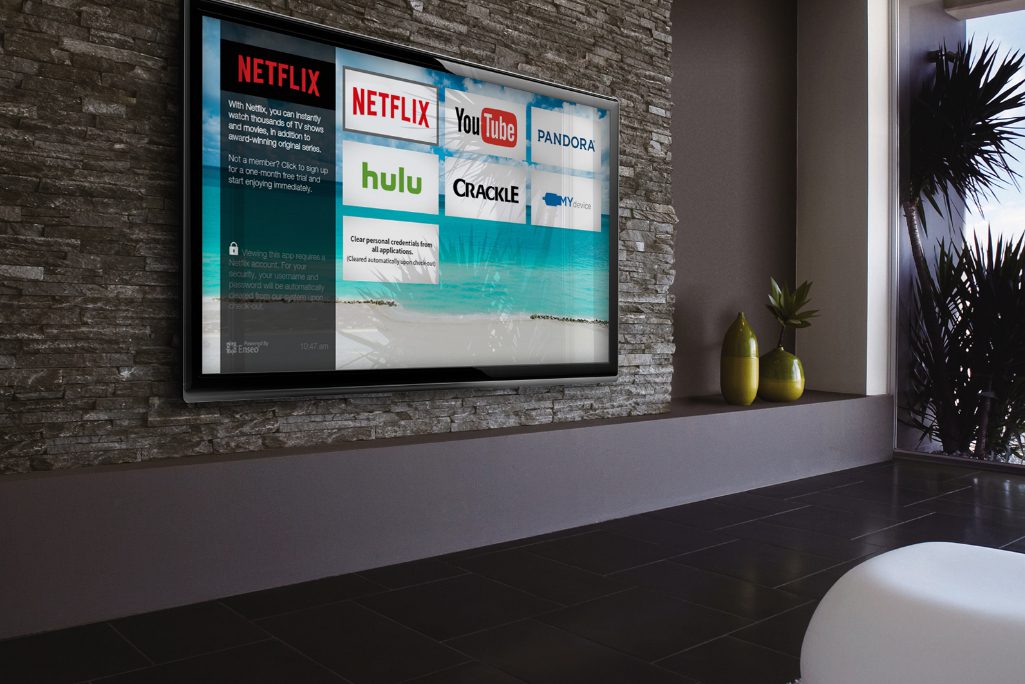Skift Take
Private equity firm HIG Capital has taken a majority stake in Enseo, a provider of digital in-room entertainment tech for hotels. Enseo plans to grow through acquisition. The deal is a validation of founder and CEO Vanessa Ogle's bold pivot of the tech vendor.
H.I.G. Capital, a private equity and alternative assets investment firm, has acquired a majority interest in Enseo, a company that’s best known for delivering in-room digital entertainment via hotel TVs. Properties flagged with brands such as Marriott, Hilton, and La Quinta use Enseo’s tech in almost 1,900 hotels in North America.
The companies didn’t disclose the transaction value or deal terms in Monday morning’s announcement. Enseo had been fully bootstrapped. With this deal, founder and CEO Vanessa Ogle retains some equity and moves to the role of chairman of Enseo, based in Plano, Texas.
H.I.G., based in Miami and with $44 billion of equity capital under management, also acquired Catapult Tech, Enseo’s sister company.
On June 2, H.I.G arranged a $55 million first-lien term loan investment and a $5 million revolving line of credit, according to a financial filing.
“H.I.G. is absolutely building a war chest to be able to do M&A [mergers and activities],” Ogle said. “We’re looking at M&A for growth and expansion of cross-brand services as well as vertical market expansion and international expansion.”
The private company hasn’t disclosed its current finances during the pandemic. Before the pandemic disrupted the hotel industry, Enseo had been on a trajectory to generate annual sales of $100 million, up from the $44.1 million it generated in 2016, and the $63 million it generated in 2018, according to statements it made to the Financial Times in the past.
Enseo is a provider of in-room entertainment content solutions and managed services primarily to the hospitality market, serving more than 300,000 rooms worldwide. If you’ve ever stayed at a U.S. hotel and watched Netflix or Hulu via your own account through the room TV, you’ve probably used Enseo’s tech without realizing it.
More recently the company has been expanding to the senior living and higher education sectors. Its competitors include vendors such as Sonifi, World Cinema, Comcast for Business, and Samsung.
Todd Ofenloch, managing director at H.I.G., said in a statement that Enseo is well-position to offer employee safety systems, internet-of-things room controls, and contactless technologies.
Bold Pivot for Hotel Tech
Ogle launched Enseo 21 years ago. The company began by offering behind-the-scenes tech to support guest room entertainment, such as by selling set top boxes and tuners for high definition televisions to enable interactivity with devices sold by other companies.
Providers such as HBO wanted security precautions to assure that their high-definition content wouldn’t get copied or misused. So Enseo handled both the technical and commercial problems related to delivery. It also created guest welcome pages and entertainment programming screens for hotel TVs. It gave hotel managers a a dashboard that allowed them to manage, monitor, and control all pieces of technology in guest rooms.
Around 2013, Ogle led a risky pivot of Enseo and its sister company Catapult Tech. She saw the rise of streaming services, also known as over-the-top (OTT) services, such as Netflix, and wanted to bring that to hotels. The internet and satellite dish TV boom was leaving most business travelers with better entertainment options in their homes than at hotels, and interest in pay-per-view TV at hotels was tumbling.
“I felt quite strongly at the time that the most important content coming into the guest room in the future would be content that guests would be carrying with them or through their own subscription services,” Ogle said. “I went to the existing integrators who were our partners and asked for them to expand into offering the over-the-top streaming services. Every single one of them said, ‘No.'”
Pivoting Enseo from being a tech vendor to a systems integrator meant competing against some of its tech partners and revamping the company’s product development and business model. Ogle took out a loan and revamped the company’s business, which became unprofitable for a while.
“During recessions, when I was getting second mortgages on my house to make payroll, I had regretted not using institutional capital to fund the company,” Ogle said. “But when I realized I needed to do cannibalization of my business to do a major transformation, I was glad I was a bootstrapped managing partner of the business because it let me make quick decisive strategy choices. I don’t believe most institutional investors would have tolerated that large of a pivot.”
Enseo became an integrator that provided a single source for in-room entertainment, high-speed internet access, and digital signage for hotels. It got ahead of some competitors by finding a way to deliver its services over the coaxial, or coax, cables many older properties had already installed — sparing them from having to do expensive retrofits, Ogle said.
Netflix signed up early, putting Enseo in the same category as other integrators such as major TV manufacturers and cable companies. Mandarin Oriental and Marriott were early adopters. In February, the firm signed a deal with WarnerMedia to make the HBO app available for subscription in hotel rooms powered by Enseo’s in-room entertainment platform.
The company has since expanded into products such as an alert system that offers panic buttons for hotel staff in emergencies, and internet-of-things tech, which lets a guest control their room thermostat, lighting, and other functions without touching the physical switches in the room.
Ogle pitches to hotel owners that Enseo will save them money by letting them manage multiple services on one software suite. Enseo uses an “open architecture,” meaning that hotels can plug Enseo’s serices into technology from other vendors as long as those vendors also use universal standards and aren’t closed systems.
As hotels come out of the pandemic, they continue to have many vacant rooms. Enseo enables managers to shut off energy usage in rooms remotely while also identifying malfunctions remotely, Ogle said.
This month, the company launched a virtual desk agent where guests can speak to a hotel customer service person working remotely, a bit like taking a Zoom call from an agent in a hotel lobby.
“The pandemic focused hotel owners back on the basics,” Ogle said. “Enseo stands in a fabulous position to really serve this market and grow right now in a tremendous way.”
Once the pandemic is over, hotels may think bigger.
“The long-term bigger picture is for hotels to match guests’ at-home experience with more than just the over-the-top video services,” Ogle said.
“Hotel rooms should let guests unlock their door with their phone, play any streaming service they have subscriptions to on the room’s speakers, control the thermostat and lighting from their own mobile phone, and order room service via voice commands,” Ogle said. “That’s the vision the sector has to build to.”
The Daily Newsletter
Our daily coverage of the global travel industry. Written by editors and analysts from across Skift’s brands.
Have a confidential tip for Skift? Get in touch
Tags: 21c hotels, hotel tech, hotel tech stack, hotel technology, la quinta, marriott, mergers and acquisitions, netflix, private equity, tv
Photo credit: Example of an in-room entertainment display run by Enseo, a hotel tech company based in Plano, Texas, that was acquired in June 2021 by private equity firm H.I.G. Enseo


